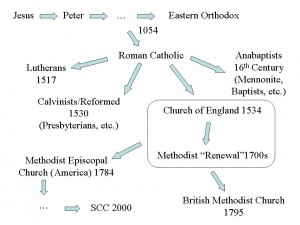Three Simple Rules – Stay in Love with God
Sycamore Creek Church
September 26, 2010
1 John 4:20-5:5
Tom Arthur
Peace, Friends!
What comes to mind when you think of rules? Usually we think of rules as negative things. But rules can also be life giving. Consider biking. It’s a good rule that when you want to stop, you should use the back brake more than the front brake otherwise you’ll end up over the handlebars. If you’re riding a motorcycle the rule is the opposite. These are good rules to know if you want to enjoy biking. Then there’s the classic rule about not sticking your tongue to a frozen pole. It will stick. And if you like fishing, it’s good to know the rule to follow when you get a fish hook stuck in you. Don’t try to pull it out. Go to the emergency room. They’ll numb you up, pop the hook out from the inside, cut the barb off, and then it will come out nice and easy. I learned the rule the hard way after I tripped on my brother’s fishing line and sunk the hook in his thumb. It was painful just to watch my dad try to pull it out. Yikes!
This is the last sermon in a series on three simple rules. They are:
1. Do no harm.
2. Do good.
3. Stay in love with God.
Today we explore staying in love with God.
When I look at those three rules I wonder why this one is last. Why isn’t loving God first? Doesn’t do no harm and doing good flow from the love of God? Yes and no. There is a dynamic relationship between the three. We tend to think of actions flowing from the heart, and this is true, but actions also affect the heart.
Sarah and I recently watched a movie called Paris, Je T’Aime (Paris, I Love You). This movie is made up of several different short scenes of love and romance in Paris. Each scene is directed by a different director. One scene tells the story of a husband who intends to end his marriage. He planned to meet his wife at a restaurant and tell her that he was leaving her for another woman. When she shows up, she begins sobbing. He thinks that she knows about his affair, but she pulls out a piece of paper with the results of some medical tests that show that she has terminal Leukemia. In that moment he decides to stick it out. He begins by breaking off the relationship with his mistress (do no harm). Then he begins taking care of his wife by serving her, even amidst all the things that annoy him about her (do good). In the end he falls back in love with her and says, “By acting like a husband in love, I became a husband in love.”
Actions affect, shape, and form the heart, and the heart then sustains actions over the long haul.
We’ve been using the letters of John to explore these three rules and today we turn to John’s first letter. Look for the connection between the heart and the hands, between doing no harm, doing good, and staying in love with God:
1 John 4:20-5:5 (NLT)
20 If someone says, “I love God,” but hates a Christian brother or sister, that person is a liar; for if we don’t love people we can see, how can we love God, whom we have not seen? 21 And God himself has commanded that we must love not only him but our Christian brothers and sisters, too.
5:1 Everyone who believes that Jesus is the Christ is a child of God. And everyone who loves the Father loves his children, too. 2 We know we love God’s children if we love God and obey his commandments. 3 Loving God means keeping his commandments, and really, that isn’t difficult. 4 For every child of God defeats this evil world by trusting Christ to give the victory. 5 And the ones who win this battle against the world are the ones who believe that Jesus is the Son of God.
This is God’s teaching, God’s story, for us today. Thank you, God!
Let’s take a closer look at verse two:
1 John 5:2 (NLT)
We know we love God’s children if we love God and obey his commandments.
Let’s put this in the three simple rules language: We know we do no harm and do good to God’s children if we love God and do no harm and do good. There is a cyclical nature between the hands and the heart here. If that’s not clear enough, look closely at a more literal translation of the third verse:
1 John 5:3 (NRSV)
The love of God is this, that we obey his commandments
Love = doing no harm and doing good. They are the same thing. The relationship we have with one another in the church isn’t just something between us, it’s also about our relationship with God. You can’t separate the two. They affect one another. So if you want to stay in love with God, then love one another by doing no harm and doing good.
At the same time there are definite habits of directly staying in love with God. They’re just like the habits we have of staying in love with anyone we love. Consider your spouse. I have habits of staying in love with Sarah. When she comes home, I get up out of my chair and greet her with a hug and a kiss. We eat meals together regularly. We pray together most mornings and evenings. We have a date night every Friday night. These are the habits that keep my heart turned toward my wife.
Likewise, there are H.A.B.I.T.S. that sustain one’s love for God. They are:
H – Hang out with God (prayer, meditation, worship, communion, etc.)
A – Accountability to others (giving an account to others of how you’re doing with these three rules)
B – Bible reading, study, memorization (ignorance of God’s story is ignorance of God)
I – Involvement with the church (giving your prayers, presence, gifts, service, and witness to the people of the church)
T – Tithing (living simply and giving generously)
S – Serving (sharing your talents with the church, community and world)
Let’s dive deeply into one way of hanging out with God: prayer. I’d like to teach you one way to pray. It’s not the only way to pray. It’s not even necessarily the best way to pray for everyone, but it is a biblical pattern of prayer. We’re calling it a 1-5 Prayer: one sentence in five parts:
1-5 Prayer
Address
Attribute
Request
Purpose
Closing
Some of you may know this as a collect prayer (pronounced “call-lect”). It is a simple one sentence prayer and it all flows together.
Address
We’ll walk through each of the five parts. The first is the address. This is who we’re talking to, God. Most of us use one or two names of God when we address God in prayer. We might use Lord, God, or Father. These are all good names, but we find all kinds of names for God in the Bible. Some of them include:
Creator
Eternal God
Father
Good God
Gracious God
Holy God
Loving God
Merciful God
Savior
Yahweh (Hebrew for “I Am”).
So we might begin a prayer saying:
Holy God…
Attribute
The second part of the 1-5 prayer is the attribute. It has to do with God’s character. God’s character flows out of God’s name. They are intimately connected. So if you began with “Holy God” then you’d “play jazz” or improvise on this name. Holiness has to do with purity. Holiness is simplicity. When you are holy you are the same thing through and through. So you might continue your prayer by saying something like:
Holy God, you are love through and through…
Request
The third part of the 1-5 prayer is the request. The request also flows out of God’s name and God’s character. That is to say that if you’re asking something of God but you can’t think of an attribute or character trait of God that would naturally lead God to grant your request, then you probably are asking for the wrong thing. God does not give things that are inconsistent with God’s character.
One other thing is worth mentioning about the request. Use strong verbs. We so often water down what we’re asking for that it sounds so wishy washy: “God, we just want to pray and ask that you might be with so and so…” Forget it. Use strong verbs like:
Deliver
Save
Empower
Grant
Give
Sustain
Protect
Heal.
So continuing with our example prayer you might pray:
Holy God, you are love through and through; purify with your love not only my/our actions but also my/our motivation…
Purpose
The fourth part of the prayer is the purpose statement. It usually begins with “so that” and answers the question of why God should grant this request. What is it about what you’re asking that should get God’s attention. Once again this can flow out of God’s name and God’s character. So continuing with our prayer:
Holy God, you are love through and through; purify with your love not only my/our actions but also my/our motivation, so that I/we might be holy too…
Closing
The fifth and last part of our 1-5 prayer is the closing. We are told to ask in the name of Jesus (John 14:13-14) so often people close prayers saying, “In Jesus’ name” or “in the name of Jesus Christ.” The early Christians generally prayed to the Father through the Son and by the Spirit (the Trinity: one God in three persons). You will often hear me close a prayer to God the Father saying, “through Jesus Christ and by the power of your Holy Spirit.”
That leaves the “amen.” Amen doesn’t mean “that’s the end.” It literally means “yes” or “I agree.” Technically speaking, the “amen” isn’t for the one praying, since he or she already agrees with what they have just said, but the “amen” is the community’s opportunity to agree (or not!) with what was just prayed. Generally speaking people don’t know when to say “amen” until the person praying says it. So while it’s technically redundant for the one praying to agree with him/herself, it is probably the easiest for the community if one ends one’s prayers with “amen.” This whole conundrum is why you will often hear me close a prayer saying, “And all God’s people said…” And you all say, “Amen!”
Closing out our prayer, then, we might pray:
Holy God, you are love through and through; purify with your love not only my/our actions but also my/our motivations, so that I/we might be holy too, in the name of Jesus. Amen.
Biblical Basis
So where does this 1-5 prayer come from? It isn’t obvious, but this pattern of prayer comes from Jesus himself. Consider the Lord’s Prayer:
Address – God’s name: Our Father in Heaven
Attribute – God’s character: Hallowed be your name.
Purpose – So what (Jesus, a master prayer freely moves the parts of the prayer around to fit the circumstance): Your kingdom come, your will be done, on Earth as it is in heaven.
Request – Strong verbs underlined: Give us this day our daily bread, Forgive us our sins, As we forgive those who sin against us, Save us from the time of trial and deliver us from evil.
Closing (whether Jesus actually used this closing is somewhat debated by scholars): For the kingdom, the power, and the glory are yours now and for ever. Amen.
I have a book full of these kinds of prayers for all kinds of situations. One I like is a prayer for the good use of leisure. When was the last time you prayed a prayer about your leisure time? I love it!
For the Good Use of Leisure
O God (address), in the course of this busy life, give us times of refreshment and peace; and grant that we may so use our leisure to rebuild our bodies and renew our minds (request), that our spirits may be opened to the goodness of your creation (purpose); through Jesus Christ our Lord. Amen (closing).
This prayer does not include an attribute. It shows that this form of prayer is flexible. As you learn it you will find that it is really quite flexible.
Here are some more examples of 1-5 prayers:
For Peace among the Nations
Almighty God our heavenly Father, guide the nations of the world into the way of justice and truth, and establish among them the peace which is the fruit of righteousness, that they may become the kingdom of our Lord and Savior Jesus Christ. Amen.
For the Right use of God’s Gifts
Almighty God, whose loving hand has given us all that we possess: Grant that we may honor you with our substance, and, remembering the account which we must one day give, may be faithful stewards of your bounty, through Jesus Christ our Lord. Amen.
For the Care of Children
Almighty God, heavenly Father, you have blessed us with the joy and care of children: Give us calm strength and patient wisdom as we bring them up, that we may teach them to love whatever is just and true and good, following the example of our Savior Jesus Christ. Amen.
For Quiet Confidence
O God of peace, who has taught us that in returning and rest we shall be saved, in quietness and in confidence shall be our strength: By the might of your Spirit lift us to your presence, where we may be still and know that you are God; through Jesus Christ our Lord. Amen.
Do no harm. Do good. Stay in love with God. John Wesley, the 18th century spiritual revolutionary who began the Methodist renewal movement nicely summed up staying in love with God by developing daily habits of prayer in a letter to one of his pastors. He wrote:
“O begin! Fix some part of every day for private exercises. You may acquire the taste which you have not; what is tedious at first will afterwards be pleasant. Whether you like it or no, read and pray daily. It is for your life; there is no other way: else you will be a trifler all your days.”





Recent Comments